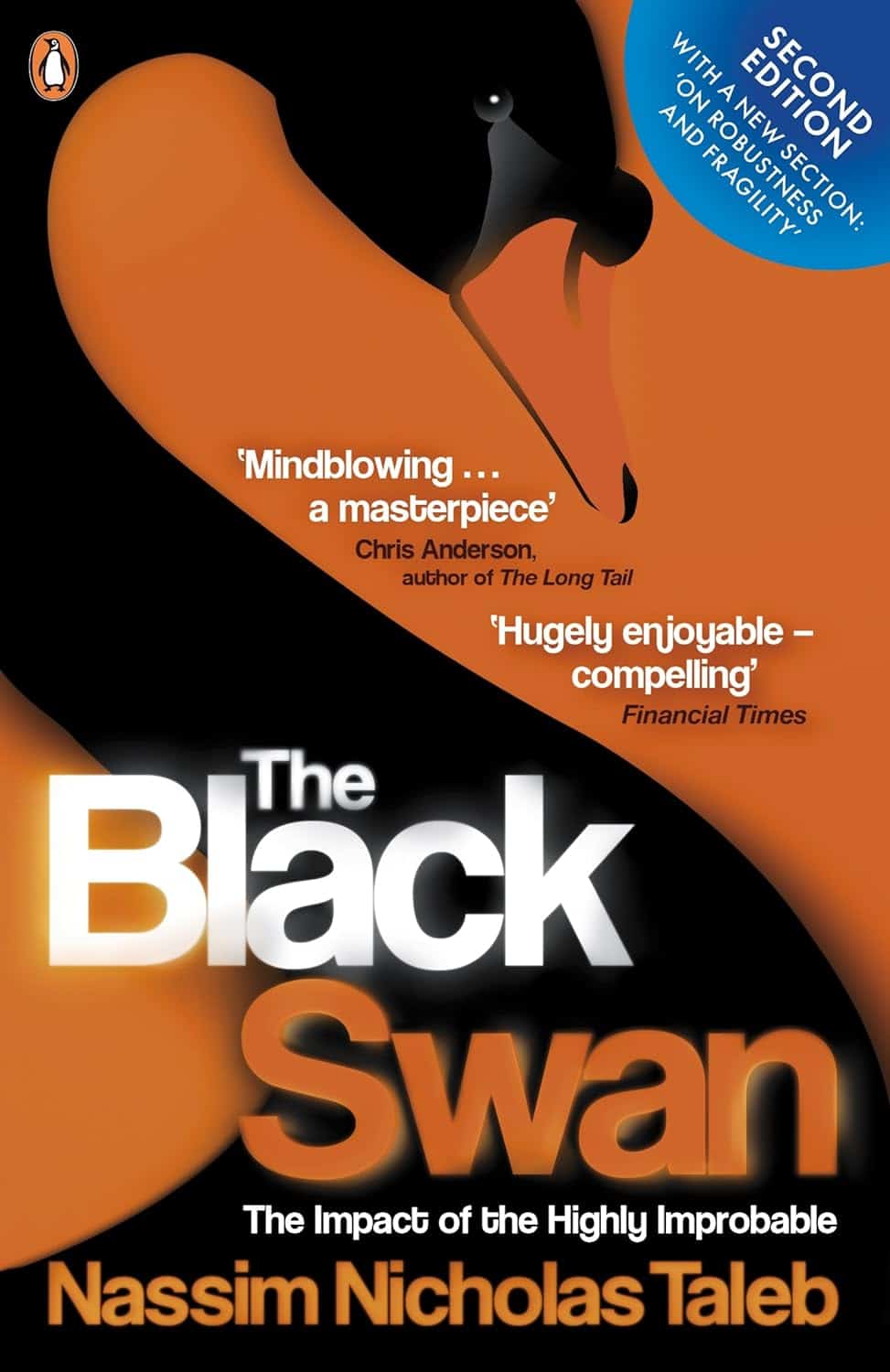Overview : The Black Swan Book
-
Book Title: The Black Swan
-
Author: Nassim Nicholas Taleb
-
Publication Date: April 2007
-
Rating: 4.5
-
price: $16.38
-
Pages: 480
Author Information
Nassim Nicholas Taleb is a renowned scholar, statistician, and former trader known for his expertise in risk analysis and complex systems. His work, The Black Swan: The Impact of the Highly Improbable,* explores how unpredictable, rare events shape our world, urging readers to reconsider conventional approaches to risk and uncertainty.
Introduction The Black Swan Book Review
This book review of Nassim Nicholas Taleb's The Black Swan delves into the critical analysis of books that explore the profound impact of rare, unpredictable events. Through engaging insights, it challenges traditional risk models and highlights how randomness reshapes our understanding of markets, decisions, and life itself. Perfect for those seeking deeper perspectives on uncertainty.
The Black Swan Book Summary
Taleb, a former options trader turned philosopher, presents The Black Swan book review, introducing "Black Swan" events—rare, unpredictable occurrences with extreme impacts often rationalized in hindsight. This book offers summaries and insights blending philosophy, statistics, and real-world examples, showcasing how such events shape history, finance, and technology disproportionately. A must-read for profound book insights.
"What we call here a Black Swan is an event with the following three attributes: First, it is an outlier, as it lies outside the realm of regular expectations, because nothing in the past can convincingly point to its possibility. Second, it carries an extreme impact. Third, in spite of its outlier status, human nature makes us concoct explanations for its occurrence after the fact, making it explainable and predictable."
Analysis of Themes
The Fallacy of Prediction
Taleb critiques the financial industry's reliance on forecasting models that assume normal distribution of events. He argues that real-world phenomena, especially in complex systems like financial markets, follow a "fat-tailed" distribution where extreme events are more common and impactful than traditional models suggest.
Cognitive Biases in Finance
The book delves into psychological aspects that hinder our ability to anticipate Black Swan events. Taleb discusses biases such as the narrative fallacy and the ludic fallacy, which lead investors and analysts to oversimplify past events and underestimate the complexity of real-world financial scenarios.
Antifragility in Investing
Taleb introduces the concept of "antifragility" - the property of systems that benefit from shocks and volatility. This idea has profound implications for investment strategies, suggesting that portfolios should be designed not just to withstand market volatility, but to potentially benefit from it.
Writing Style
Taleb's writing is provocative and engaging, blending academic rigor with practical examples and a touch of humor. While some readers may find his style confrontational, it effectively challenges readers to question their assumptions about risk and uncertainty in the financial world.
The Black Swan Book Strengths and Weaknesses
Strengths:
- Offers a fresh perspective on risk assessment in finance
- Challenges conventional wisdom about market prediction
- Provides practical insights for building robust investment strategies
Weaknesses:
- Some readers may find Taleb's writing style overly combative
- The book's philosophical digressions might be challenging for readers seeking purely practical advice
Comparative review of similar books
"The Black Swan" stands out among financial literature for its interdisciplinary approach. While books like Burton Malkiel's "A Random Walk Down Wall Street" also challenge the predictability of markets, Taleb's work goes further by examining the philosophical and psychological underpinnings of our relationship with uncertainty. Compared to more traditional finance books like Benjamin Graham's "The Intelligent Investor," Taleb's approach is more iconoclastic, questioning the very foundations of modern portfolio theory and risk management.
Impact on Financial Thinking
Since its publication, "The Black Swan" has significantly influenced thinking in finance and risk management. Its ideas have been particularly relevant in understanding market crashes, such as the 2008 financial crisis and the 2020 COVID-19 market shock. The book has sparked discussions about the limitations of Value at Risk (VaR) models and has encouraged a more holistic approach to risk assessment in banking and investment. It has also contributed to the growing interest in tail risk hedging strategies among institutional investors.
Relevance to Current Market Trends
In today's rapidly changing financial landscape, Taleb's ideas remain highly relevant. The rise of cryptocurrencies, for instance, can be seen as a potential Black Swan in the making, challenging traditional notions of currency and value. Similarly, the increasing frequency of extreme weather events and geopolitical shocks underscores the importance of building antifragile investment portfolios that can withstand and potentially benefit from unexpected market turbulence.
Highlights from The Black Swan Book
Power of Rare Events: Black Swan events are highly improbable but have massive impacts on history, finance, and personal lives.
Unreliable Predictions: Standard forecasting models often fail because they overlook the possibility of extreme, unpredictable occurrences.
Cognitive Biases: Humans are biased toward predictability, which blinds us to randomness and uncertainty.
Embrace Anti-Fragility: Instead of avoiding chaos, build systems that thrive under stress and benefit from disorder.
Preparedness over Prediction: Taleb advises focusing on resilience to unforeseen events rather than attempting to predict them.
Accepting Uncertainty: Recognize that life is unpredictable and adapt to handle surprises.
Conclusion
"The Black Swan" is a must-read for anyone serious about understanding the nature of risk in finance and beyond. While it may challenge your preconceptions, it offers invaluable insights for navigating the uncertainties of the modern financial world. Whether you're a seasoned investor, a financial professional, or simply interested in gaining a deeper understanding of market dynamics, this book provides a thought-provoking and potentially paradigm-shifting perspective.
Disclosure: This post contains affiliate links. If you click through and make a purchase, I may receive a commission at no additional cost to you. In conclusion, this article has provided an overview of the topic at hand.





